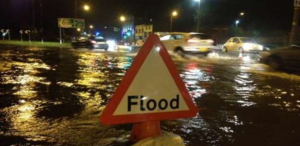Storm Desmond: The Aftermath
Everyone will recall the devastation caused by Storm Desmond in early December last year when 55,000 homes in Carnforth, Lancaster and Morecambe lost power w hen Lancaster’s main substation was flooded . Many streets and traffic lights also were also out due to a power cut in Lancaster during rush hour.
hen Lancaster’s main substation was flooded . Many streets and traffic lights also were also out due to a power cut in Lancaster during rush hour.
Instances of flooding are fortunately relatively rare and flood defences have been built locally which reduce the risk for known high risk areas. However, flash floods, which are much more difficult to predict, can occur without warning. These occur where the drains cannot initially cope with the amount of water produced by intense storms. Part of the district remains at risk of flooding and existing defences can be overtopped during significant flood events.
Long before Desmond, a key outcome within the Parish Plan was the need to identify flood risks within our community and the importance of planning ahead to minimise any potential disruption caused by flooding. With Desmond in mind, however, Lancaster City Council’s Civil Contingencies Officer attended a recent meeting of the Parish Council to share practical advice, guidance and documentation that will help produce a Community Emergency Plan to prepare for emergencies that could affect our community.
This a big piece of work that will be ongoing throughout the year covering in some detail the following steps:
Step 1—Planning for an emergency: outlining key stages in getting people involved; understanding communities needs and collecting and making use of local knowledge and information; identifying and preparing for risks; assessing community skills, resources and equipment that can used during or after an emergency
Step 2—What to do in an emergency: including, activation of our plan in an emergency; evacuation, if necessary, of residents from their homes to a safe place; what to do if communications are disrupted and messages need to be delivered in a consistent way
Step 3—Practising and reviewing our plan: sharing the plan with the community to get their views and with the authorities; reviewing and updating the plan to ensure that it continues to meet the changing needs of the community
Initially, the plan will be developed by a working group of elected Members of the Parish Council with support from the Clerk and Lancaster City Council. That said, community resilience will be something that many people and groups will already do. The council will be keen to work together with agencies, businesses, community groups and individuals to establish a community network and develop an ongoing process of using and enhancing relationships that will build resilience within the community.
If you can help in anyway or want to hear more about the work of the Parish Council please contact the Clerk or why not attend one of the council’s meetings to share your views and ideas.
